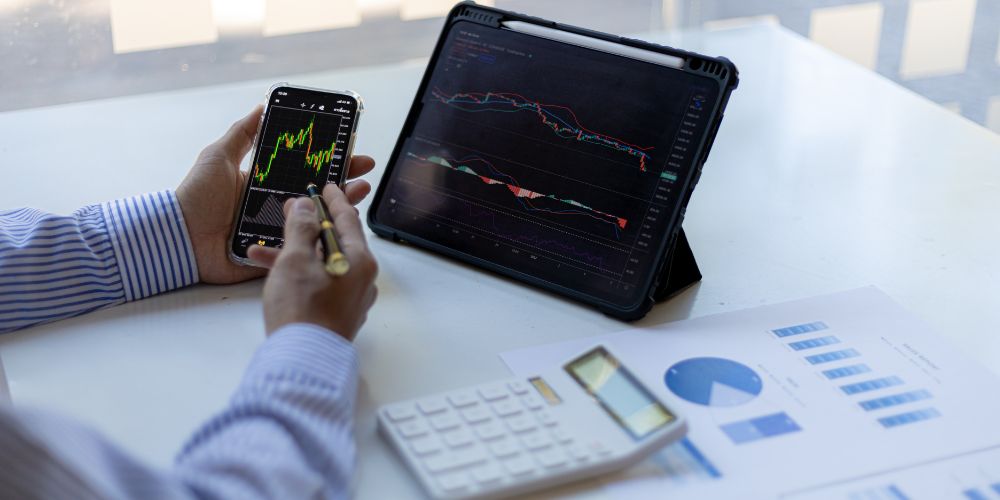The world of trading has seen significant transformations over the years, evolving from traditional floor trading to electronic, and now to a new horizon where artificial intelligence (AI) plays a pivotal role.
With AI’s infiltration into various industries, the finance sector has not been left untouched. This raises the compelling question: Can artificial intelligence replace traders?
The Role of Traders in Financial Markets
Traders are at the heart of financial markets, buying and selling securities, commodities, and other financial instruments. Their roles require not just an understanding of the markets but also quick decision-making, a knack for risk assessment, and often, a strong gut feeling.
Traders analyze market conditions, foresee potential market shifts, and make decisions based on both quantitative data and qualitative judgment.
Can Artificial Intelligence Replace Traders?
Artificial intelligence has gradually integrated into the trading sphere, introducing automated systems capable of analyzing large datasets, predicting market trends, and executing trades at speeds no human could match.
AI applications in trading vary from algorithmic trading, which follows predefined instructions for placing trades, to more sophisticated machine learning models that adapt their strategies based on market behavior.
Advantages of AI in Trading
AI’s Superior Data Analysis Capabilities
AI excels at processing and analyzing vast amounts of data rapidly, a process that would take humans considerably longer.
This capability allows AI systems to identify patterns and insights from historical data, facilitating more informed trading decisions.
Efficiency and Accuracy of AI in Trade Execution
AI systems can execute trades more efficiently and with greater accuracy than humans. They can process transactions in milliseconds, capitalizing on market opportunities the moment they arise.
Moreover, AI reduces the potential for human error, executing trades exactly as programmed.
Emotional Neutrality of AI
One of AI’s most significant advantages is its immunity to emotional bias. Human traders can be influenced by fear, greed, or stress, leading to suboptimal trading decisions. In contrast, AI strictly follows its programming, making decisions based solely on data and predefined strategies.
Limitations of AI in Trading
Technological Limitations of AI Systems
Despite their abilities, AI systems still face technological limitations, particularly in interpreting non-quantitative data.
Human traders can consider news, rumors, and other qualitative factors in their decisions, nuances that AI might not fully comprehend.
The Unique Value of Human Judgement
There remain situations where the intuition and experience of human traders are irreplaceable.
Humans can understand context, make connections between seemingly unrelated events, and think creatively—capabilities that AI has yet to match fully.
Ethical and Misuse Concerns
The use of AI in trading also raises ethical questions and the potential for misuse. Decisions made by AI could be manipulated if not monitored properly, leading to unfair trading advantages or even market manipulation.
AI and Job Displacement Concerns
The fear that AI might replace human jobs in trading is a topic of concern. However, while AI can automate certain tasks, there is still a crucial need for human oversight.
AI systems require constant monitoring and refinement, roles that demand human expertise.

The Future of Trading with AI
The future seems to be leading towards a symbiotic relationship between AI and human traders. As AI technology advances, its role in trading will undoubtedly increase.
However, this doesn’t signify the end for human traders. Instead, it suggests an evolution of their roles, where they work alongside AI, leveraging its strengths while contributing human insight and oversight.
Predictive Trends in AI Development
Investments in AI by financial institutions are growing, indicating a trend towards more AI-driven trading platforms.
These platforms will likely become more sophisticated, capable of handling complex trading strategies and decision-making processes.
The Emerging Collaborative Model of Human-AI Trading Teams
A collaborative model where human traders and AI systems work together is emerging.
In this model, AI handles data analysis and execution, while humans focus on strategy development, oversight, and incorporating qualitative insights.
This collaboration aims to harness the best of both worlds, optimizing trading outcomes.
Frequently Asked Questions
Can AI predict stock market movements?
AI can perform predictive analyses based on historical data and trends, but its predictions are not foolproof. The market’s inherent unpredictability means that AI, like humans, can’t always foresee movements accurately.
Will AI create or destroy jobs in the trading sector?
AI will likely transform jobs in the trading sector rather than eliminate them outright. As AI takes over more technical, data-driven tasks, human traders will adapt, focusing on strategy, oversight, and areas where human insight is invaluable.
How can traders stay relevant in an AI-driven market?
Traders can stay relevant by developing skills that complement AI, such as data analysis, AI system monitoring, and refining trading strategies based on AI insights. Understanding AI and its applications in trading will also be crucial.
Are there trading sectors where AI cannot compete with human traders?
AI currently struggles in areas requiring qualitative judgment and understanding of human behavior, such as predicting reactions to unexpected news events. Sectors that rely heavily on these aspects may see less AI competition.
How secure is AI in handling sensitive financial data?
Security is a top priority when it comes to AI in trading. While no system is entirely immune to breaches, stringent security measures and constant vigilance are necessary to protect sensitive financial data in AI-driven systems.
Conclusion
In answering whether AI can replace human traders, it’s clear there’s no straightforward answer.
AI offers significant advantages in data analysis, efficiency, and eliminating emotional bias. Yet, the unique value of human judgment and the ability to interpret non-quantitative information remain vital.
The future of trading likely lies in the collaboration between AI and human traders, each playing to their strengths to navigate the complex and ever-changing financial markets.








